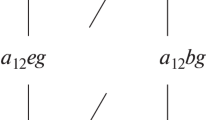Abstract
We present a framework that provides a logic for science by generalizing the notion of logical (Tarskian) consequence. This framework will introduce hierarchies of logical consequences, the first level of each of which is identified with deduction. We argue for identification of the second level of the hierarchies with inductive inference. The notion of induction presented here has some resonance with Popper's notion of scientific discovery by refutation. Our framework rests on the assumption of a restricted class of structures in contrast to the permissibility of classical first-order logic. We make a distinction between deductive and inductive inference via the notions of compactness and weak compactness. Connections with the arithmetical hierarchy and formal learning theory are explored. For the latter, we argue against the identification of inductive inference with the notion of learnable in the limit. Several results highlighting desirable properties of these hierarchies of generalized logical consequence are also presented.
Similar content being viewed by others
REFERENCES
Barwise, J.: 1975, Admissible Sets and Structures, Springer-Verlag, Berlin.
Carnap, R.: 1950, Logical Foundations of Probability, 2nd edn, University of Chicago Press, Chicago, IL.
Earman, J.: 1992, Bayes or Bust? MIT Press, Cambridge, MA.
Ebbinghaus, H. D., Flum, J. and Thomas, W.: 1994, Mathematical Logic, 2nd edn, Springer-Verlag, Berlin.
Etchemendy, J.: 1999, The Concept of Logical Consequence, CSLI Press, Stanford.
Glymour, C.: 1985, Inductive inference in the limit, Erkenntnis 22, 23–31.
Gold, E. M.: 1967, Language identification in the limit, Inform. and Control 10, 447–474.
Goodman, N.: 1954, Fact, Fiction and Forecast, Athlone Press, London.
Hacking, I.: 1968, Reply to Salmon's 'The Justification of Inductive Rules of Inference', in I. Lakatos (ed.), The Problem of Inductive Logic, North-Holland, Amsterdam.
Hintikka, J. and Suppes, P.: 1966, Aspects of Inductive Logic, North-Holland, Amsterdam.
Howson, C. and Urbach, P.: 1989, Scientific Reasoning: The Bayesian Approach, Open Court, La Salle.
Jain, S., Osherson, D., Royer, J. and Sharma, A.: 1999, Systems that Learn, 2nd edn, MIT Press, Cambridge, MA.
Jeffrey, R.: 1980, Studies in Inductive Logic and Probability, University of California Press, Berkeley.
Kaye, R.: 1991, Models of Peano Arithmetic, Oxford University Press.
Kelly, K. T.: 1996, The Logic of Reliable Inquiry, Oxford University Press, New York.
Klenk, V.: 1976, Intended models and the Löwenheim-Skolem theorem, J. Philos. Logic 5, 475–489.
Kyburg, H.: 1970, Probability and Inductive Logic, Macmillan.
Martin, E. and Osherson, D. N.: 1998, Elements of Scientific Inquiry, MIT Press.
Parson, C.: 1990, The uniqueness of the natural numbers, Iyyun, A Jerusalem Philosophical Quarterly 39, 13–44.
Pitt, L.: 1989, Probabilistic inductive inference, J. ACM 36(2), 383–433.
Popper, K.: 1959, The Logic of Scientific Discovery, Hutchinson.
Putnam, H.: 1983, Models and reality, in P. Benacerraf and H. Putnam (eds.), Philosophy of Mathematics, Cambridge University Press, pp. 421–444.
Reichenbach, H.: 1949, The Theory of Probability, University of California Press.
Salmon, W.: 1968, The justification of inductive rules of inference, in I. Lakatos (ed.), The Problem of Inductive Logic, North-Holland, Amsterdam.
Shapiro, S.: 1991, Foundations without Foundationlism, Clarendon Press, Oxford.
Shoenfield, J.: 1967, Mathematical Logic, Addison-Wesley.
von Wright, G.: 1957, The Logical Problem of Induction, Basil Blackwell, Oxford.
Author information
Authors and Affiliations
Rights and permissions
About this article
Cite this article
Chopra, S., Martin, E. Generalized Logical Consequence: Making Room for Induction in the Logic of Science. Journal of Philosophical Logic 31, 245–280 (2002). https://doi.org/10.1023/A:1015714624624
Issue Date:
DOI: https://doi.org/10.1023/A:1015714624624




